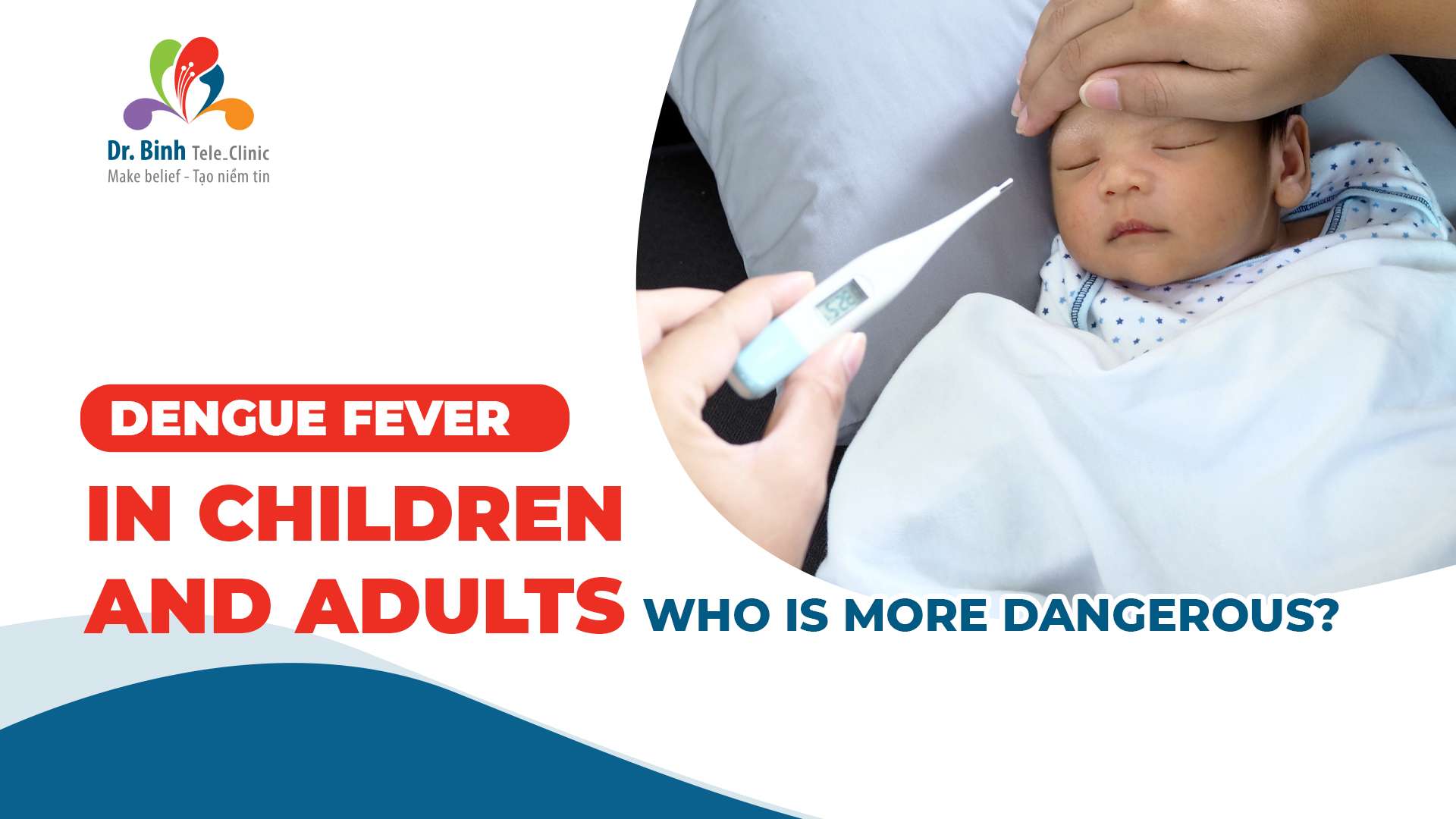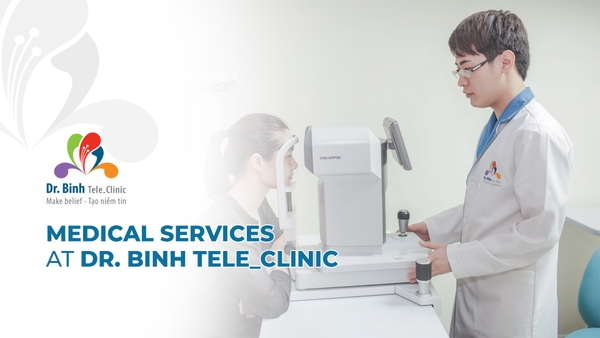DENGUE FEVER IN CHILDREN AND ADULTS - WHO IS MORE DANGEROUS?
- Dr.Binh Tele_Clinic offers up to 30% off on endoscopy with anesthesia combos
- Special Offers at Dr.Binh Tele_Clinic on Vietnamese Women’s Day
- Dangerous complications of cerebral infarction
- What to know when treating urinary stones?
20/07/2022
-0 Bình luận
Dengue fever is a dangerous infectious disease that often appears in the summer and at the time of the change of seasons when there is a lot of rain and a humid environment. Dengue occurs in adults and children; this is also one of the diseases with a high mortality rate and no specific treatment.
So what is the difference between dengue fever in children and adults, and in which subjects is it more dangerous?
 1. What is Dengue? Why is dengue so dangerous?
1. What is Dengue? Why is dengue so dangerous?
The dengue virus causes dengue fever. This acute infectious disease can be transmitted from person to person through the vector mosquito. Dengue fever usually has symptoms such as rash and high fever; severe cases can cause a drop in blood pressure, convulsions and death.
According to WHO statistics, dengue fever tends to appear more in Asian countries, especially in Vietnam, the annual number of infections is up to 50-1000 cases per year. Up to now, dengue fever is still a disease that does not have a vaccine, method, or cure.
2. Dengue fever symptoms in adults and children
Adults and children have similar symptoms when having dengue fever, but because of different conditions, the level of danger is also different.
|
Adults |
Children |
|
- When you have dengue fever, usually the patient will have a high fever that can reach 40 degrees for 4-7 days with symptoms such as pain behind the eyes, headache, joint and muscle pain, rash, nausea or vomiting a lot, internal bleeding... After a period of high fever with the above symptoms, the patient will have signs of blood in the stool, skin hemorrhage (skin with red dots), fatigue... - Dengue shock syndrome: This complication of common dengue fever is a rather severe symptom causing massive bleeding, low blood pressure... This condition occurs when the body's active or passive immunity state. This condition is hazardous and can be fatal for the patient. |
- Dengue fever in children often appears with the first manifestation of high fever lasting from 2-7 days accompanied by skin congestion, red face, sore throat, nausea, fatigue... - After the onset, the patient will have signs such as bleeding under the skin in the form of red dots, growing in the armpits, chest, forearms, and legs; nose bleeds, tooth roots, and blood out. - Many cases of severe change show signs of dengue shock such as delirium, lethargy, vomiting, liver enlargement, cold hands and feet, and irregular pulse. This is a dangerous condition; taking the child to a medical facility for timely treatment is necessary. Otherwise, it will lead to death. |

Although the symptoms of dengue fever in adults and children are different, the general condition goes through 3 stages:
- Stage 1: The patient shows signs of high fever from 39-40 degrees in the first 2 days; this symptom is often confused with common viral fevers. The patient is diagnosed with dengue fever only when the Dengue NS1 Ag test is performed, and the result is positive.
- Stage 2: This stage is one of the dangerous stages that can cause the patient to die at any time. Usually, after the first 2 days of high fever, from the 3rd to the 7th day, the patient has signs of skin hemorrhage (nosebleed, bleeding gums); subcutaneous hemorrhage in the form of a red rash or patches. In this stage 2, if the patient is not detected and treated in time, it will lead to severe complications such as dengue shock syndrome, more serious internal bleeding than brain hemorrhage and death.
- Stage 3: This is the recovery phase. The patient has passed the dangerous stage, and his condition is gradually improving. Patients can eat and normally drink, platelets increase, and the body slowly recovers to a positive state.
3. How dangerous is dengue fever?
Children and adults are both susceptible to dengue fever; however, because of their different physical health and resistance, when infected with dengue fever, children are often heavier than adults and are at risk of falling ill into a state of shock and re-shock much more than adults.

When having dengue fever in the early stages, many people are often subjective when they see that the body only has a fever and only when the disease shows abnormal signs will they go to medical facilities for treatment. This subjectivity has made many cases of the condition worse, and the family members could not handle it in time, leading to complications such as thrombocytopenia, organ failure, and even death.
4. How to treat and prevent dengue fever?
There is currently no cure or cure for dengue fever. Therefore, we need to follow the treatment of dengue fever as directed by the doctor in children and adults.

- Reduce fever properly: If the patient has a high fever above 38.5 degrees, reduce the fever with Paracetamol according to the prescribed dose, it can be repeated after 4-6 hours. If the patient has a fever again, cool the body and rehydrate when fever to avoid complications when high fever.
- Nutritional balance: When having dengue fever, the patient has signs of loss of appetite, sore throat, and nausea. Therefore, it is necessary to use soft, easy-to-digest foods such as porridge and milk divided into many small meals; Drink lots of water such as cresol electrolytes, filtered water, and fruit juices... to cool the body from the inside and support the elimination of the body.
- Provide enough vitamins A, B, and C for the body to rebuild the immune system, improve resistance, and enhance recovery function.
- If home treatment measures are taken, but the disease does not improve or has more severe symptoms such as bleeding, cold hands and feet, weak pulse, sore throat, difficulty breathing, etc., the family member needs to take the patient hospitalized for treatment under the supervision of a doctor.
The best way to limit dengue fever is to take proactive precautions to prevent the spread of this disease. Regularly clean the place of residence, house and surrounding environment, paying particular attention to the peak time of season change and heavy rain; kill mosquitoes and mosquito breeding places such as puddles and bushes.
Dengue fever in children and adults has a high risk of complications and is one of the most dangerous infectious diseases. Take the initiative to find out and immediately contact Dr. Binh Tele_Clinic follow the hotline 19009204 if you or your family have abnormal health signs for timely treatment.
CS1: DR. BINH TELE_CLINIC
No. 11-13-15 Tran Xuan Soan, Pham Dinh Ho Ward, Hai Ba Trung District, Hanoi
Hotline: 19009204
Email: info@drbinh.com – Website: www.drbinh.com
Facebook: fb.com/biquyetchamsocsuckhoe
CS2: 365 MEDIHOME THANH LONG CLINIC
1st floor, Executive Building, Thang Long Industrial Park, Dong Anh, Hanoi
Hotline: 19009204
Website: thanglong.365medihome.com.vn/
Facebook: fb.com/365medihome





















Bình luận của bạn